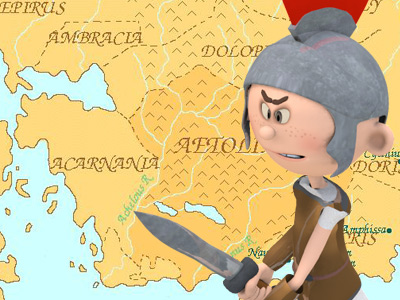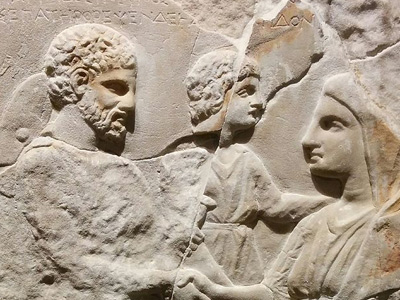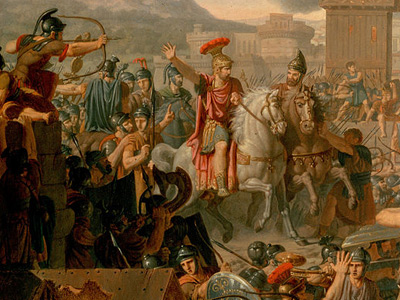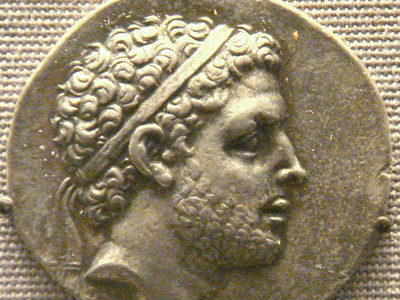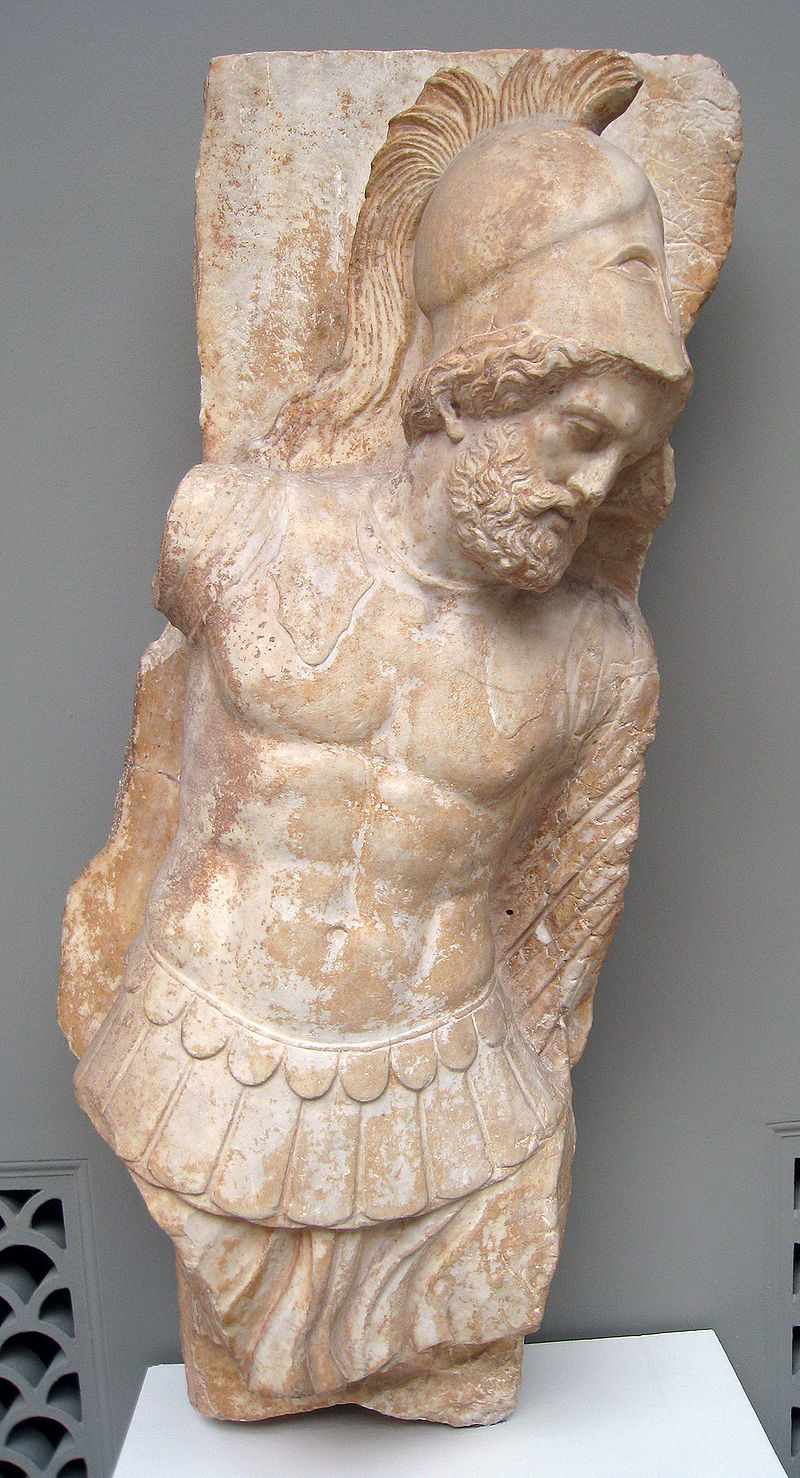Third Macedonian War (171–168 BC)
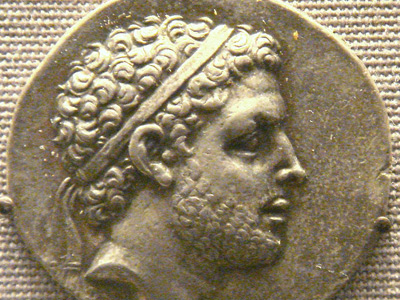
The Third Year of the War (169 BC)
The consuls for 169 BC where Quintus Marcius Philippus (for the second time) and Gnaeus Servilius Caepio. The Macedonian War was assigned to Quintus Marcius and the command of the fleet to the praetor Quintus Marcius Figulus. The troops allocated for Greece were 6,000 Roman infantry, 6,000 Latin infantry, 250 Roman cavalry and 300 allied cavalry there. The old soldiers were discharged, so each legion would have 6,000 soldiers. The soldiers who had been granted leave by the previous consul to curry favour were recalled. The recruitment for the fleet was 1,000 Roman freedmen and 500 Italians and 500 Sicilians.
When the snow covered the mountains of Thessaly, thus protecting Macedon form Roman attacks, Perseus decided to attack the Illyrians who were allowing a passage to the Romans The Roman Republic was a form of government of Rome and the era of the classical Roman civilization when it was run through public representation of the Roman people. Beginning with the overthrow of the Roman Kingdom (traditionally dated to 509 BC) and ending in 27 BC with the establishment of the Roman Empire, Rome's control rapidly expanded during this period - from the city's immediate surroundings to hegemony over the entire Mediterranean world.. Their king, Gentius, had been wavering about who to support. Perseus moved to the land of the Penestae (in southern Illyria) and went on Stubera with 10,000 infantry 2,000 light infantry and 500 cavalry. He marched on Uscana. Livy had previously said that this city belonged to Perseus and the Romans failed to seize it. However, here it is given as being under the Romans without any report of the city having been taken by the Romans. Perseus sent envoys to the officers of the mixed Roman and Illyrian garrison, but they refused to surrender and he begun a siege. The commanders asked to be allowed to leave with their weapons. Perseus agreed, but then disarmed them. He moved the population of the city to Stubera and sold them as slaves. The 4,000 enemy troops were sent to various towns. He then marched on Draudacum, whose garrison surrendered, and then took eleven forts, taking 1,500 Romans. He seized Oaeneus, killed the men and put the women and children in custody. He sent envoys to Gentius, to urge him for an alliance. Gentius said he did not have enough money for war. Perseus, who had a reputation for being a miser, sent the enjoys back but did not mention anything about money, even though he had the proceeds from the sale of slaves. Perseus ravaged Ancrya, went back to Uscana, strengthened its area and then returned to Macedon.
The Roman Republic was a form of government of Rome and the era of the classical Roman civilization when it was run through public representation of the Roman people. Beginning with the overthrow of the Roman Kingdom (traditionally dated to 509 BC) and ending in 27 BC with the establishment of the Roman Empire, Rome's control rapidly expanded during this period - from the city's immediate surroundings to hegemony over the entire Mediterranean world.. Their king, Gentius, had been wavering about who to support. Perseus moved to the land of the Penestae (in southern Illyria) and went on Stubera with 10,000 infantry 2,000 light infantry and 500 cavalry. He marched on Uscana. Livy had previously said that this city belonged to Perseus and the Romans failed to seize it. However, here it is given as being under the Romans without any report of the city having been taken by the Romans. Perseus sent envoys to the officers of the mixed Roman and Illyrian garrison, but they refused to surrender and he begun a siege. The commanders asked to be allowed to leave with their weapons. Perseus agreed, but then disarmed them. He moved the population of the city to Stubera and sold them as slaves. The 4,000 enemy troops were sent to various towns. He then marched on Draudacum, whose garrison surrendered, and then took eleven forts, taking 1,500 Romans. He seized Oaeneus, killed the men and put the women and children in custody. He sent envoys to Gentius, to urge him for an alliance. Gentius said he did not have enough money for war. Perseus, who had a reputation for being a miser, sent the enjoys back but did not mention anything about money, even though he had the proceeds from the sale of slaves. Perseus ravaged Ancrya, went back to Uscana, strengthened its area and then returned to Macedon.
Lucius Coelius, a commander in Illyria did not do anything while Perseus was there. After he left, he tried to recover Uscana, but was repulsed, and went back to Lychnidus. He sent a detachment to the area to receive the hostages from the cities which had remained loyal (they were sent to Apollonia) and from the Parthini (also for southern Illyria) who were sent to Dyrrhachium (modern Durrës, Albania). Perseus was invited by the Epirots to attack Aetolia and advanced on to Stratus, the strongest Aetolian city. He marched with 10,000 infantry and 300 cavalry. He could not pitch camp on the snow-covered Mount Citium and had to encamp elsewhere. He then was held up at the River Aracthus because of its deep water. He built a bridge, crossed, and then met Archidamus, a distinguished Aetolian, who had persuaded the nobles to betray Stratus. However, while he was away, the pro-Roman faction called in a Roman garrison. Dinarchus, the commander of the Aetolian cavalry also arrived with 600 infantry and 100 cavalry to support Perseus, but when he saw the changed situation he changed sides. Due to the winter weather, Perseus gave up. He went to Aperantia, which, through the influence of Archidamus willingly surrendered. Archidamus was made its governor. Perseus returned to Macedon.
Appius Claudius was eager make up for his defeat in Illyria and attacked a stronghold in Epirus. He had force of 6,000 men, Romans and contingents of Thesprotians and from Chaon (both from Epirus). He was repulsed by a strong garrison Perseus had left there. He besieged the city, but lifted it due to a report that Perseus was marching there. He was pursued up an almost impassable mountain and lost 1,000 men, while 200 were captured. He then encamped on the plain. The pursuers where joined by an Epirot force. They ravaged the area; 1,000 troops of the city of Antigonea were killed and 100 of them were captured in an ambush. They then encamped near Appius Claudius, who decided to go back to Illyria. He sent the soldiers to winter camps and returned to Rome.
Advertisement

These books are available for download with iBooks on your Mac or iOS device, and with iTunes on your computer. Books can be read with iBooks on your Mac or iOS device.

These books are available for download with iBooks on your Mac or iOS device, and with iTunes on your computer. Books can be read with iBooks on your Mac or iOS device.
( Click image to enlarge)
In early spring the consul, Quintus Marcius, sailed with 5,000 men to reinforce his legions, disembarked at Ambracia and moved towards Thessaly. Figulus took his fleet into the gulf of Corinth, left his ships at Creusa, and went to join the fleet stationed at Chalcis overland. Aulus Hostilius, who had been protecting Rome’s allies, had restored discipline in his troops and was encamped in Thessaly, handed over his troops and returned to Rome. The consul started marching towards Macedon. Perseus sent troops to the mountain passes into Macedon.
Quintus Marcius carried out a heroic march into Macedon through the tough mountains of the Olympus range. He sent 4,000 light infantry ahead to secure the road to a pass near Octolophus, but the road was so difficult and steep that they advanced only fifteen miles and seven miles the next day. They spotted an enemy camp guarding that pass. Quintus Marcius stopped on a hill which gave a wide view and set one day’s rest. The next day he attacked with half of his troops. The enemy had seen the Roman camp and was ready. There was a skirmish between light troops. The narrow ridge allowed only for the deployment of small numbers of light troops and engagement was difficult. Perseus, who was not far, did not intervene or send more troops. Despite the presence of the enemy, Quintus Marcius had no choice but to persist. Leaving some troops to guard the summit, marched across through trackless places, having sent forward a party to open a road. The allied troops were ordered to protect them while clearing the way through the forests. Marcius kept the cavalry and baggage before him and closed the rear with the legions. The descent from the hill was tough the pack animals often fell. In impassable steeps the elephants threw off their riders and roared loudly, frightening the horses. A series of bridges (made with two long posts fastened to the earth to which ten-yards beams were attached) was made where the rocks were steep to help the elephants. The Romans advanced only seven miles. They waited for the troops at the camp to join them. On the fourth day they reached a pass and on the fourth they went through similar and difficult terrain. As they got close to the plain some troops encamped between Heracleum and Libethrus, some occupied a valley and part of the plain. The greater part was on hills.
Perseus panicked. He evacuated the area and all the strong posts, leaving them open to the Romans, even though the area was easily defensible. He ordered the inhabitants of Dium, where he was encamped, to move to Pydna and also moved his statues there. Quintus Marcius could and did advance, but he was trapped. The Romans could leave the area only through two passes, through the Vale of Tempe to Thessaly or unto Macedon by way of Dium and both were guarded. The Romans could not withdraw to Thessaly of have any road open for their supplies. The Vale of Tempe was difficult to get through. The defile was very dangerous even if it was not guarded. The precipices on both sides were very steep and there was a passage which was so narrow that there was barely room for a loaded horse. There were guards in four places. One was at the entrance, another in a thick forest and the third on the road where the valley was narrowest (Livy did not specify the characteristics of the fourth). The only way to retreat or receive supplies was to cross the same mountains the Romans had come through, but they were very difficult. It was also hard to pass through unnoticed as the enemy was posted on the heights. The only option was the area between the bottom of Mount Olympus and the sea, but that was only a mile wide, half of which was the bog of the mouth of the River Baphirus and a large part of the remaining plain was taken up by the town. The small remaining space could be easily closed off by a short rampant with towers and the material for its construction was abundant.
Quintus Marcius ordered Spurius Lucretius, who was in Larissa (Thessaly), to capture the deserted forts around Vale of Tempe. He sent scouts to check the roads around Dium and then he marched to the city. It was so rich and well-fortified that Quintus Marcius could not believe his luck that it had been evacuated. He continued his march. Agasse surrendered and to get a good reputation he did not garrison it and did not ask for taxes. He moved on to the river Ascordus, but as he was getting further away from the supplies form Thessaly, plunder became scant and provisions were scarce. Therefore, he returned to Dium. The Roman fleet arrived, but he was told that the transport ships were in Magnesia (further south). Luckily, he was informed by Lucretius that the forts he had taken had plenty of corn. Quintus Marcius moved his quarters to Phila to distribute corn to the soldiers on the spot. Livy noted that some people alleged that he had withdrawn because of fear that if he had stayed he would have had to risk a battle, while others said that he let his gains slip. With his withdrawal Perseus marched back to Dium, rebuilt the fortifications the Roman had pulled down and encamped on bank of the Enipeus to use this difficult to cross river as a defence. Meanwhile, Quintus Marcius sent 2,000 men, from Phila to seize Heracleum, halfway between Dium and the Vale of Tempe, and moved his quarters there, as if he intended to besiege Dium. Instead, he prepared for the winter and had roads built for the transport of supplies from Thessaly.
In the meantime, Figulus sailed from Heracleum to Thessalonica. He pillaged the countryside and repulsed sorties from the towns. In Thessalonica stones were catapulted even on the ships. The troops were re-embarked. He made for Aenia, fifteen miles away, and pillaged its fertile countryside. He then sailed to Antigonea and did the same, but a Macedonian detachment intercepted the troops and killed 500 men. There was another fight by the coast and, assisted by men from the ships, the Romans killed 200 enemies The fleet sailed on to the district of Pallene (the Chalkidiki peninsula), whose territory by far the most plentiful. There Figulus was joined by 20 ships of king Eumenes II of Pergamon and five ships of king Prusias I of Bithynia. This encouraged him to besiege Cassandrea, which connected the Pallene peninsula (one of the three long peninsulas which extend from the Chalkidiki peninsula) with the rest of the land. An attack was repulsed by the city garrison. The arrival of a Macedonian ship from Thessalonica with Gallic auxiliaries led to the lifting of the siege. The Romans and Eumenes considered besieging Torone, but changed their minds because it had a strong garrison. They went on to Demetrias, but they saw that the walls were fully manned. Thus, they brought the fleet into harbour at Lolcos, pillaging the countryside there first.
So as not to remain inactive, Quintus Marcius sent 5,000 men, to Meliboea by Mount Ossa, where it stretches out into Thessaly in a strategic position to command Demetrias. Works for a siege started. Perseus heard about this attack and sent one of his commanders with 2,000 men. His instructions were that if he could not dislodge the Romans at Melibœa he was to march on Demetrias before the Figulus and Eumenes moved there from Iolcos. When the Romans at Melibœa saw him arriving they burnt the siege works and left. The Macedonians hurried to Demetrias. Figulus and Eumenes reached the walls of the city. It was rumoured that there were negotiations between Eumenes and Antimachus, the governor of the city and a Cretan, Cydas. Whatever the case, the Romans left. Eumenes sailed to visit the consul and then returned to Pergamon. Figulus sent part of the fleet to winter at Sciatus and went to Oreum in Euboea with the rest of the fleet because it was a better base to send supplies to Macedon and Thessaly. Livy noted different accounts about Eumenes. According to one he did not give assistance to Figulus, even though he had asked for it and that when he left for Pergamon he was not on good terms with the consul. Quintus Marcius could to get him to leave his Gallic cavalry behind.
Ambassadors from Bithynia and from Rhodes went to Rome They both proposed peace. The Bithynians said that their king had promised Perseus to mediate for peace and asked the senate to give him this role. The Rhodians said that during the interwar period they had started a friendship with Perseus which they broke unwillingly because Rome wanted to draw them in an alliance. Now the war disrupted their trade, bought losses in port duties and in provisions and there was scarcity on the island. They said that they wanted peace and that they had also sent envoys to Perseus to tell him to make peace. They would consider what measures to take against either party that would prevent putting an end to the war. This message was considered arrogant. Livy noted that one source wrote that it was ignored while others wrote that the senate replied that the Rhodians and Perseus had contrived machinations against Rome and that the words of the ambassadors confirmed this. Once Perseus had been defeated, Rome would consider how to make due retribution.
HISTORY
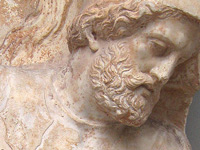
RESOURCES
This article uses material from the Wikipedia article "Third Macedonian War (171–168 BC)", which is released under the Creative Commons Attribution-Share-Alike License 3.0.
© Stories Preschool. All Rights Reserved.
